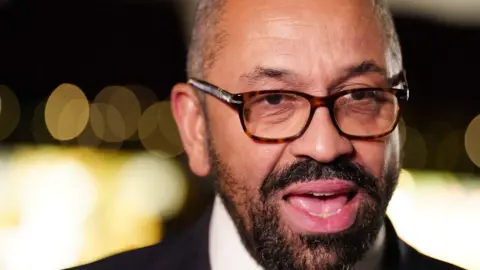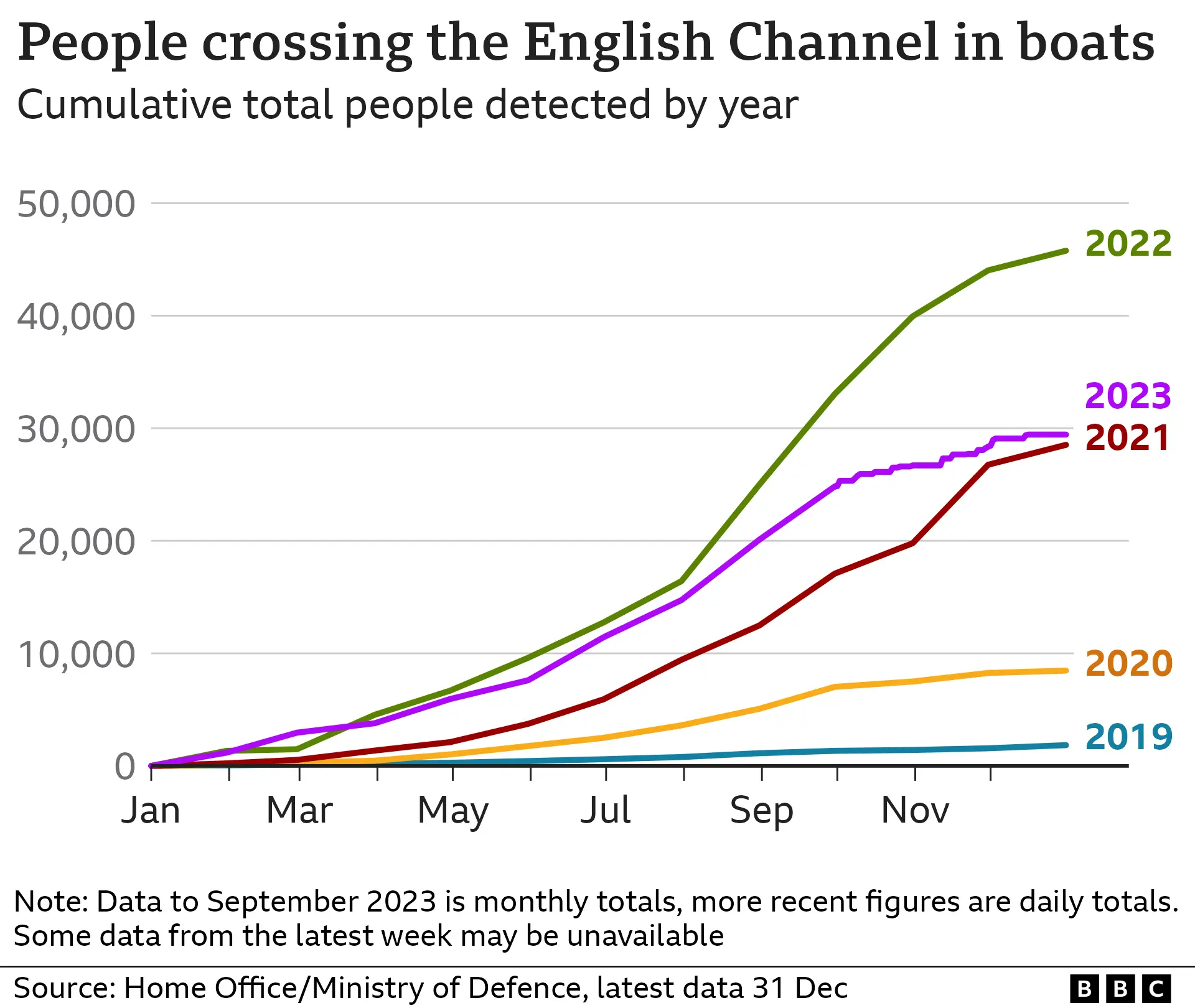James Cleverly insists older asylum case backlog dealt with
 PA Media
PA MediaThe home secretary has rejected claims that the government was wrong to say it has cleared the backlog of older asylum cases - despite new figures showing thousands of cases remain unresolved.
James Cleverly said "every single" legacy application - the term for those made before asylum laws changed in 2022 - had been processed.
PM Rishi Sunak pledged to "abolish" that asylum backlog by the end of 2023.
New figures show the total asylum backlog now stands at 99,000.
But among legacy applications - all those made before 28 June 2022 - the Home Office were still looking at 4,500 "complex" cases - some involving security concerns, Mr Cleverley admitted.
Questioned on BBC Radio 4's Today programme about whether the backlog was cleared if cases are not fully resolved, Mr Cleverly said the government had "committed to processing all those applications" not completing them.
"Our commitment was to process them and we've done that," he added.
The government says the cut in the total number of asylum claims from 136,000 this time last year to 99,000 is due to resolving the "legacy" backlog of applications.
This is due to a "tenfold increase in the pace at which we complete the processing," Mr Cleverly said.
New backlog
However, the number of applications since June 2022 awaiting an initial decision has risen from 900 to over 94,000.
This so-called new "flow backlog" is now larger than the legacy backlog was when Mr Sunak promised to abolish it in December 2022.
Under questioning, Mr Cleverly said it was "impossible" to say how long it will take to get through outstanding asylum cases.
But he added the government enhanced the asylum system by adding "more people", refining "processes", and implementing "real accountability".

But critics have accused the government of manipulating the figures.
A third of the claims removed from the legacy backlog have not been accepted or rejected.
Most have simply been withdrawn, taken out of the system usually because the Home Office has lost touch with the claimants.
Labour's shadow home secretary Yvette Cooper said the government claim to have cleared the asylum backlog was "not true".
On social media, Ms Cooper said the government had "not even" cleared the legacy backlog.
The government's figures also counted 17,000 withdrawn cases, where the Home Office have "no idea where those people are", as part of the reduction, she said.
Enver Solomon, chief executive of the Refugee Council, said progress had been made but it was "misleading for the government to claim that the legacy backlog has been cleared as there are thousands still waiting for a decision".
He also accused the government of failing to explain why the claims of thousands of people have been withdrawn, adding: "The reality is that the Home Office has lost track of too many people who have been removed from the asylum process."
'Complex' cases
The Home Office said more than 112,000 asylum cases were processed by officials last year, exceeding the prime minister's commitment.
Of those processed, 51,469 were granted asylum and 25,550 were refused - the highest number of decisions since 2002.
The remaining applications received "non-substantive" decisions - including withdrawn applications and people who had died.
It says in one four-week period from 20 November to 17 December 2023, there were 20,481 initial asylum decisions made - more than the number of asylum decisions made in the whole of 2021.
Mr Sunak said the department's efforts were "saving the taxpayer millions of pounds in expensive hotel costs, reducing strain on public services and ensuring the most vulnerable receive the right support".
Legacy cases refer only to people in the asylum system on 28 June 2022, the day when new asylum rules came into force.
All of those cases have been reviewed but not all have been resolved with 4,500 reclassified as "complex".
The Home Office says such cases typically involve asylum seekers presenting as children - age verification, serious medical issues or checks on suspected convictions can be among the issues.
Key pledges
In January last year, the prime minister outlined five key priorities for the year - stopping boats bringing people across the English Channel was one of them.
Figures released on Monday said the number of migrants crossing the Channel had fallen year-on-year for the first time since current records began - the provisional annual total for the year, 29,437, is 36% lower than the record 45,774 crossings for the whole of 2022.
The government also said that in 2023 it had:
- returned more than 24,000 people who had no right to be in the UK, including more than 5,500 Albanians
- increased enforcement visits - 10,509 in the first nine months compared to 6,865 in the same period in 2022
- arrested 246 people smugglers.
Downing Street refused to endorse Mr Cleverly's aim to end all small boat crossings by the end of 2024.
When asked on LBC Radio if he expected to bring small boat crossing down to "zero" this year, Mr Cleverly said: "That's my target."
But the prime minister's spokesperson refused to set a specific deadline, only referring to seeing the government's emergency legislation aimed at reviving the policy of sending some asylum seekers to Rwanda, passed in Parliament.
 .
.
Sign up for our morning newsletter and get BBC News in your inbox.

